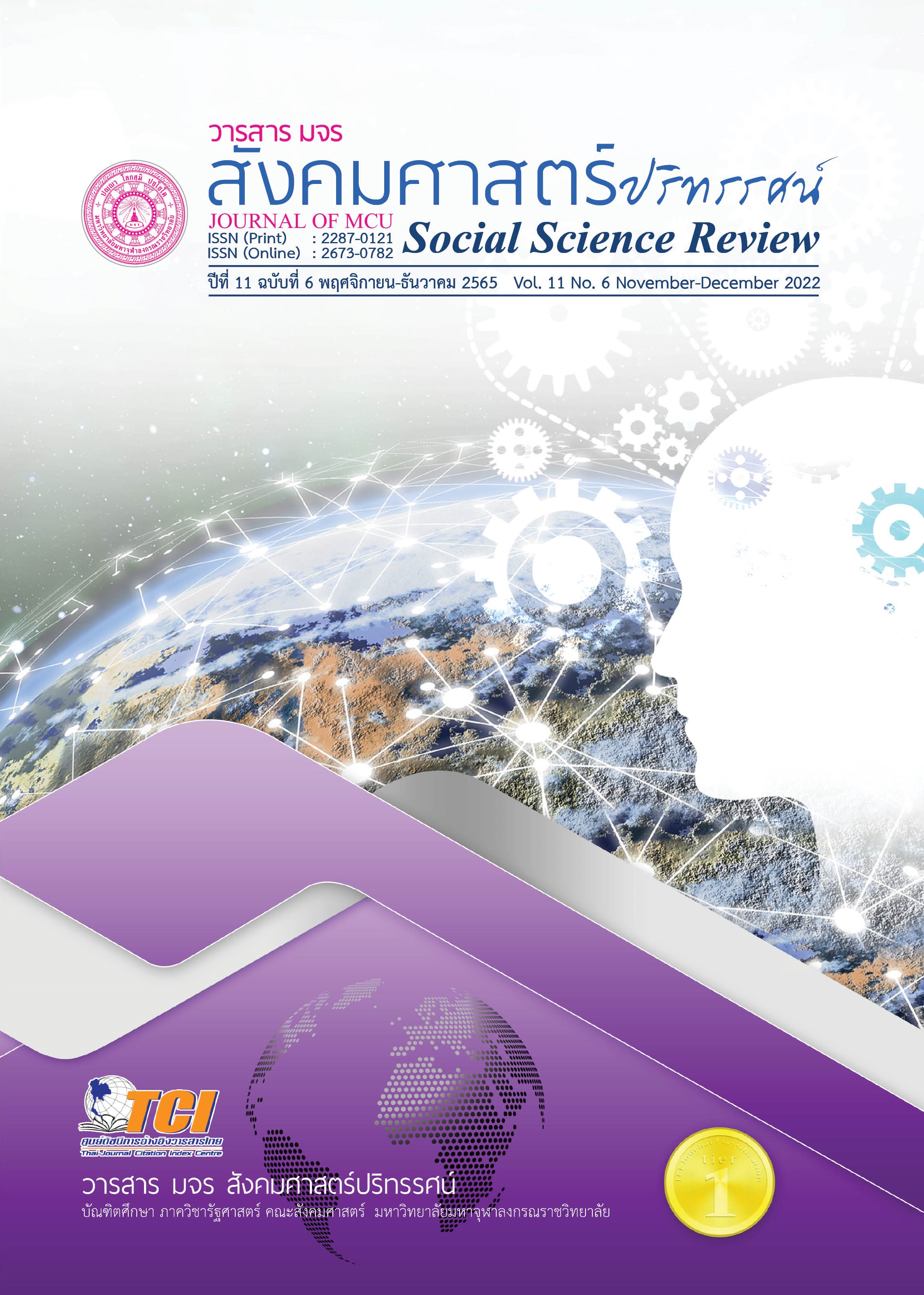ภาษีมูลค่าเพิ่ม: ฉลาดในการได้และมีอุบายในการจ่ายออก
คำสำคัญ:
ภาษีมูลค่าเพิ่ม, ฉลาดในการได้, อุบายในการจ่ายออก, หลักทิฏฐธัมมิกัตถบทคัดย่อ
ภาษีผูกพันกับทุกคนมากน้อยตามกิจกรรมของแต่ละคน ภาษีมีหลายประเภทที่รัฐจัดเก็บ ภาษีมูลค่าเพิ่ม คือภาษีชนิดหนึ่งที่จัดเก็บทางอ้อมกับผู้บริโภค ภาษีนี้เกิดจากการใช้จ่ายของผู้บริโภคผ่านผู้ประกอบการ โดยผู้ประกอบการจดทะเบียนจึงมีสิทธิ์ออก “ใบกำกับภาษี” ไว้เป็นหลักฐานแก่ผู้บริโภค และผู้ประกอบการจดทะเบียนเป็นคนกลางมีหน้าที่รวบรวมภาษีมูลค่าเพิ่มส่งรัฐทุกเดือนเป็นภาคบังคับ ผู้ประกอบการจดทะเบียนจึงต้องศึกษากฎหมายภาษีมูลค่าเพิ่มให้เข้าใจถ่องแท้ในการปฏิบัติได้ถูกต้อง และสามารถวางแผนภาษีได้ จึงเป็นที่มาของคำว่า “ฉลาดในการได้ และมีอุบายในการจ่ายออก” คือ นำส่งภาษีแต่ละเดือนตรงเวลาตามที่กำหนดไม่มีค่าปรับ จุดความรับผิดในการเสียภาษีมูลค่าเพิ่ม (Tax Point) ที่ได้ประโยชน์สูงสุดและสอดคล้องกับกฎหมาย ไม่ออกใบกำกับภาษีปลอม ไม่ขายใบกำกับภาษี เป็นต้น การประกอบธุรกิจที่ถูกต้องตามทำนองคลองธรรมด้วยหลักทิฏฐธัมมิกัตถ เป็นหลักธรรมอำนวยประโยชน์สุขขั้นต้น โดยเฉพาะหลักสมชีวิตา เลี้ยงชีวิตแต่พอดี มีการนำส่งภาษีรัฐเป็นผลให้ประเทศชาติมีรายรับนำเงินภาษีมาพัฒนาประเทศได้อย่างยั่งยืน
เอกสารอ้างอิง
กรมสรรพากร. (2564). ภาษีอากร ตามประมวลรัษฎากร 2564. สืบค้น 4 ตุลาคม 2564, จาก. https://www.rd.go.th/2596.html.(2555).
______. (2564). คู่มือภาษีซื้อต้องห้าม. สืบค้น 4 ตุลาคม 2564, จาก. https://www.rd.go.th/publish/fileadmin/user_upload/porkor/taxused/BanPasi.pdf
ชมรมธรรมธารา. (2553). บาลีวันละคำ. สืบค้น 4 ตุลาคม 2564, จาก. https://dhamtara.com/?p=10490-2433
ชัยสิทธิ์ ตราชูธรรม. (2551). คำสอนวิชากฎหมายภาษีอากร (พิมพ์ครั้งที่ 5 แก้ไขเพิ่มเติม). กรุงเทพ: สำนักอบรมศึกษากฎหมายแห่งเนติบัณฑิตยสภา.
บริษัท ปังปอนด์ จำกัด. (2564) ฐานภาษี 4 ประเภทภาษี มีกี่ประเภท ภาษีอากร ที่ดี ความหมาย ลักษณะของ นิติบุคคล. สืบค้น 4 ตุลาคม 2564, จาก. https://www.pangpond.com
พระธรรมปิฎก (ป.อ.ปยุตฺโต). (2547). ธรรมนูญชีวิต (พิมพ์ครั้งที่ 2). กรุงเทพฯ: โรงพิมพ์การศาสนา.
วีระเดช คชเสนีย์, (2564). ทำความเข้าใจเรื่อง VAT 7% อย่างถูกต้อง ประชาชนได้ประโยชน์อะไร ประเทศพัฒนาแล้วเก็บกี่ %. สืบค้น 26 กรกฎาคม 2564, จาก. https://thainews.prd.go.th/th/news/detail/TCATG210402151610620
ดาวน์โหลด
เผยแพร่แล้ว
รูปแบบการอ้างอิง
ฉบับ
ประเภทบทความ
สัญญาอนุญาต
ลิขสิทธิ์ (c) 2022 วารสาร มจร สังคมศาสตร์ปริทรรศน์

อนุญาตภายใต้เงื่อนไข Creative Commons Attribution-NonCommercial-NoDerivatives 4.0 International License.
เพื่อให้เป็นไปตามกฎหมายลิขสิทธิ์ ผู้นิพนธ์ทุกท่านต้องลงลายมือชื่อในแบบฟอร์มใบมอบลิขสิทธิ์บทความให้แก่วารสารฯ พร้อมกับบทความต้นฉบับที่ได้แก้ไขครั้งสุดท้าย นอกจากนี้ ผู้นิพนธ์ทุกท่านต้องยืนยันว่าบทความต้นฉบับที่ส่งมาตีพิมพ์นั้น ได้ส่งมาตีพิมพ์เฉพาะในวารสาร มจร สังคมศาสตร์ปริทรรศน์ เพียงแห่งเดียวเท่านั้น หากมีการใช้ภาพหรือตารางหรือเนื้อหาอื่นๆ ของผู้นิพนธ์อื่นที่ปรากฏในสิ่งตีพิมพ์อื่นมาแล้ว ผู้นิพนธ์ต้องขออนุญาตเจ้าของลิขสิทธิ์ก่อน พร้อมทั้งแสดงหนังสือที่ได้รับการยินยอมต่อบรรณาธิการ ก่อนที่บทความจะได้รับการตีพิมพ์ หากไม่เป็นไปตามข้อกำหนดเบื้องต้น ทางวารสารจะถอดบทความของท่านออกโดยไม่มีข้อยกเว้นใดๆ ทั้งสิ้น





